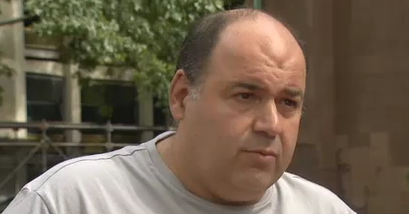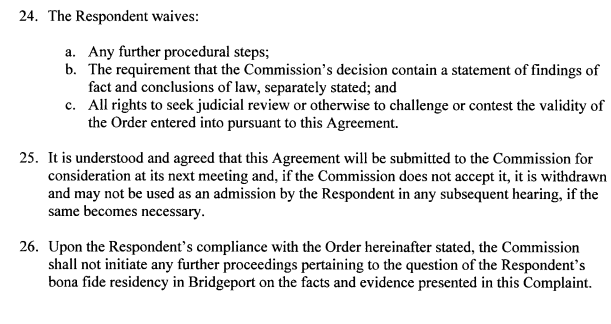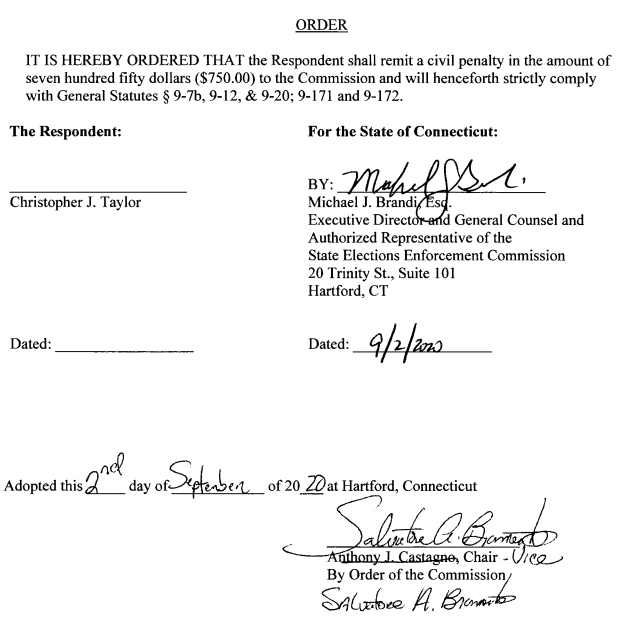
Staff and commissioners with the state agency overseeing election complaints thought they had a “consent agreement” with Chris Taylor to resolve a dispute that he had voted in Bridgeport and served on the Board of Education while a resident of Fairfield, in violation of state law. For this egregious act he had supposedly agreed to pay a civil penalty of $750. Decision here.
Baloney, says Taylor. There was never an agreed upon deal. I signed nothing. That, for sure, begs a salient question: wouldn’t a decree be signed in advance of the commission vote? The only signatures on the order are those of state commissioners. What’s protocol?
Many defendants in these types of cases would gladly pay the fine, with a carrot to avoid admission of guilt and carry on in lieu of heavy legal costs. Not Taylor, a self-deprecating, Larry-The-Cable-Guy persona, who has a history of brushes with the law. In this case he’s principled as a virtue to combat his years-long foil Maria Pereira, former school board member now city councilor, who marinates doggedly in SEEC complaints.
In an email exchange with SEEC staff attorney Kevin Ahern, Taylor’s lawyer Mark Balaban declared “My client NEVER agreed to any of the proposals. I have been waiting for return calls for over two months.”
Now what? The state is not commenting about the next step to reach a conclusion.
This seems to be one of those “ugh” moments. Someone screwed up, be it this side or that. Where’s the hug for the ugh?
How these things work: complaint (Pereira) is filed with the state, an investigator and staff lawyer, in conjunction with the commission, determine its relevance to probe. Civil fines, based on concluded violations, can be levied at the discretion of the commission. If staff and commission determine the bad acts are criminal in nature they can refer it to the proper investigative body.
For Taylor, this whole episode is much ado about nothing. A waste of taxpayer money. Critics of the state agency agree asserting for all the time, effort, money they huff and puff and fold, settling cases comparatively for meager dollars.
Taylors says he’s not settling. Period.
For Pereira the commission’s decision is not much of a tonic for a labor-intensive complaint filed more than a year ago leading to a disputed $750 fine.
See below excerpt from commission decision, a consent agreement with no signature from Taylor.





The SEEC is terrible I did a complaint where they basically had to either confirm it or say I was wrong.
http://stratfordtaxpayersforbettergovernment.blogspot.com/2017/12/state-elections-enforcement-commission.html
They sat on it for 2 years and finally fined one of the respondents $300 ( big deal )
The real issue was the Stratford Town Clerk and Republican Registrar abused their offices and have not been held accountable.
https://www.ctinsider.com/local/ctpost/article/SEEC-Former-Stratford-Town-Council-chairman-15131537.php?cmpid=gsa-ctpost-result&_ga=2.134397041.1015479398.1598491340-1169421806.1550499104
Josh Foley, a staff attorney and spokesman for SEEC, said Thursday the commission doesn’t plan on taking further action.
“There were pretty hard accusations about how Susan and I did our job that were pretty much forgotten,” DeCilio said of the SEEC agreement. “That to me is unacceptable. I want to make sure everyone knows that we did absolutely nothing wrong.”
“I knew I had done nothing wrong and I didn’t think Lou had done anything wrong,” Pawluk said.
DeCilio said he reached out to Mayor Laura Hoydick and the town’s attorneys.
“If I’ve got to file a complaint against the SEEC, I will,” he said. “They failed to do their job as far as I’m concerned.”
Nothing was ever done about the Town Officials and we are going into another election now. In 2017 Stratford officials were quick come down on some violators from the 2017 mayoral election when it benefits them.
https://patch.com/connecticut/stratford/pair-charged-voter-fraud-stratford-police these folks received felony convictions as result of this Stratford Police investigation.
Maybe the SEEC should just refer this current case to the State Attorney or they could just be running out the clock on it and hope it goes away.
Eric Berne termed that conflictual aspect of the love triangle “Let’s You and Him Fight”; and considered “the psychology is essentially feminine. Because of its dramatic qualities, LYAHF is the basis of much of the world’s literature, both good and bad”.[17]
Young adult literature has seen a rise in the popularity of the love triangle story structure (such as Twilight or The Selection). But the love triangle story structure has been around since before early classic writers like William Shakespeare and Alexandre Dumas. Shakespeare’s famous play Romeo and Juliet featured a love triangle between Juliet, Romeo, and Paris. Although more subtle, Dumas’s classics The Count of Monte Cristo and The Three Musketeers also feature love triangles strong enough to seek revenge and start a war.
Love triangles can either be relatively balanced, in which the two candidates each have a fair chance of ending up with the protagonist, or they can be lopsided, in which the hero or heroine has an obvious romantic interest in one of the candidates, and considers the other candidate as “just a friend”, but withholds a confession to avoid hurting feelings. An example of this is in the Broadway hit musical Wicked, in which dim-witted Fiyero first displays affection for Glinda the Good Witch, but then falls for Elphaba, the supposedly Wicked Witch. But in this latter case, to provide necessary tension and drama, the second platonic candidate is also very often the hero or heroine’s long-term boyfriend or girlfriend.[citation needed]
A less permanent love triangle occurs when a former lover of the main character makes an unexpected appearance to win back the character’s heart, provoking feelings of jealousy from the main character’s steady partner. However, this situation is usually not considered an actual love triangle since there is little possibility of the main character breaking up with a longtime partner to pursue a just-introduced character, and it is often used as only a test of the true depth of the main character’s devotion to their partner. In these cases, the long-term partner has usually been guilty of neglect toward the main character and in the end the relationship remains intact with the long-term partner having learned some valuable lesson.
Television
Usually, a love triangle will end with the hero or heroine confiding their feelings in the suitor they feel is most virtuous or has the most interest in them. (As in Twilight.) The other suitor usually steps aside to allow the couple to be happy, or comes to terms with their feelings, often claiming they could not love the main character as much. Sometimes they are written out of the love equation entirely by falling in love with someone else, or being killed off or otherwise eliminated. While love triangles can be accused of being clichéd, if done well, they provide insight into the complexity of love and what is best to pursue in a romantic relationship.
In television shows, a love triangle is often prolonged, delaying final declarations of love between the pursued character and suitors that may prematurely end this dynamic or displease fans. Some examples of these include Dos mujeres, un camino, 90210, Friends, The O.C., How I Met Your Mother, One Tree Hill, The Vampire Diaries and Grey’s Anatomy. Love triangles also featured prominently on soap operas, and can span more than a decade, as famously shown by Taylor Hamilton, Ridge Forrester and Brooke Logan on The Bold and the Beautiful. Another famous soap opera love triangle was the one that occurred on General Hospital between Luke Spencer, Laura Spencer, and Scotty Baldwin. Similarly, romance films also sustain this set-up until near the film’s end, although they tend to establish a more clear-cut conclusion to the romantic entanglements than in long-running TV shows.
Hey JimFox, there’s no love between these two. I can see this ending in a shooting. For less than $750.00 Maria can put a hit on Tony. When she does, I hope she doesn’t hire byproducts of the Bridgeport School system like these two: https://youtu.be/PdvjMbCawkk
what’s next?
Look at his forehead.
I anticipate a V-shaped recovery.
“…In an email exchange with SEEC staff attorney Kevin Ahern, Taylor’s lawyer Mark Balaban declared ‘My client NEVER agreed to any of the proposals. I have been waiting for return calls for over two months’…”
We’ll; there could have been a (“arranged”) “marriage,” but the state (feminine party?) was spurned… Will this lead to a vendetta? Will Daddy (State Government) be offended enough to seek “revenge” (real action)… Will the other offended “suitor” (complainant) go along for the ride — or take an alternative approach to redress (a higher-level complaint) (to whom?!)?…
We’ll have to wait for another episode of “As The City Rots” to find out what might happen… Probably the EEC will just throw some lime on the situation, per a non-decision — e.g., a nominal fine and scolding/admonishment — designed to allow everything to “settle” in time for the next election season, and just let Bridgeport weaponize said “decision” in their internecine and partisan, election warfare such that we continue to chase our own electoral tail and never gain functionality at the local level, or proportionate (to our population) power at the state level…
Jeff Kohut as Bridgeport’s leading contrarian indicator:
It started in 1965 but
when Jeff Kohut talks
about the latest episode of “As the City rots”,
you know Bridgeport’s decline
has ended and its
renaissance begun.
In other news did anybody get a absentee ballot request? This time not from the state but bpt town clerk office. That was fast election is 2 months out but they are sending the request now which I think is great!!
When all is said and done, Bport will set a record for turnout this year. 110%!
Between Trumps popularity and an AB free for all it’s inevitable.